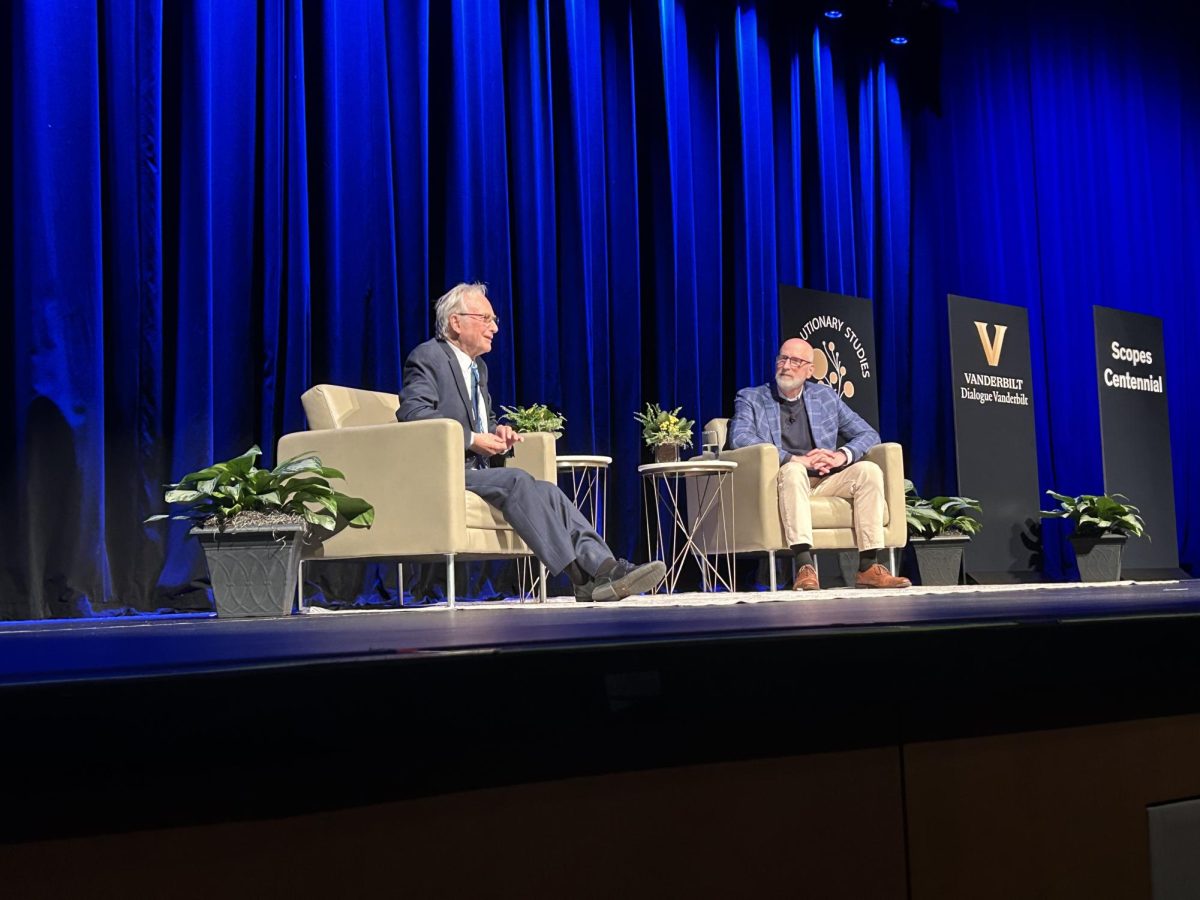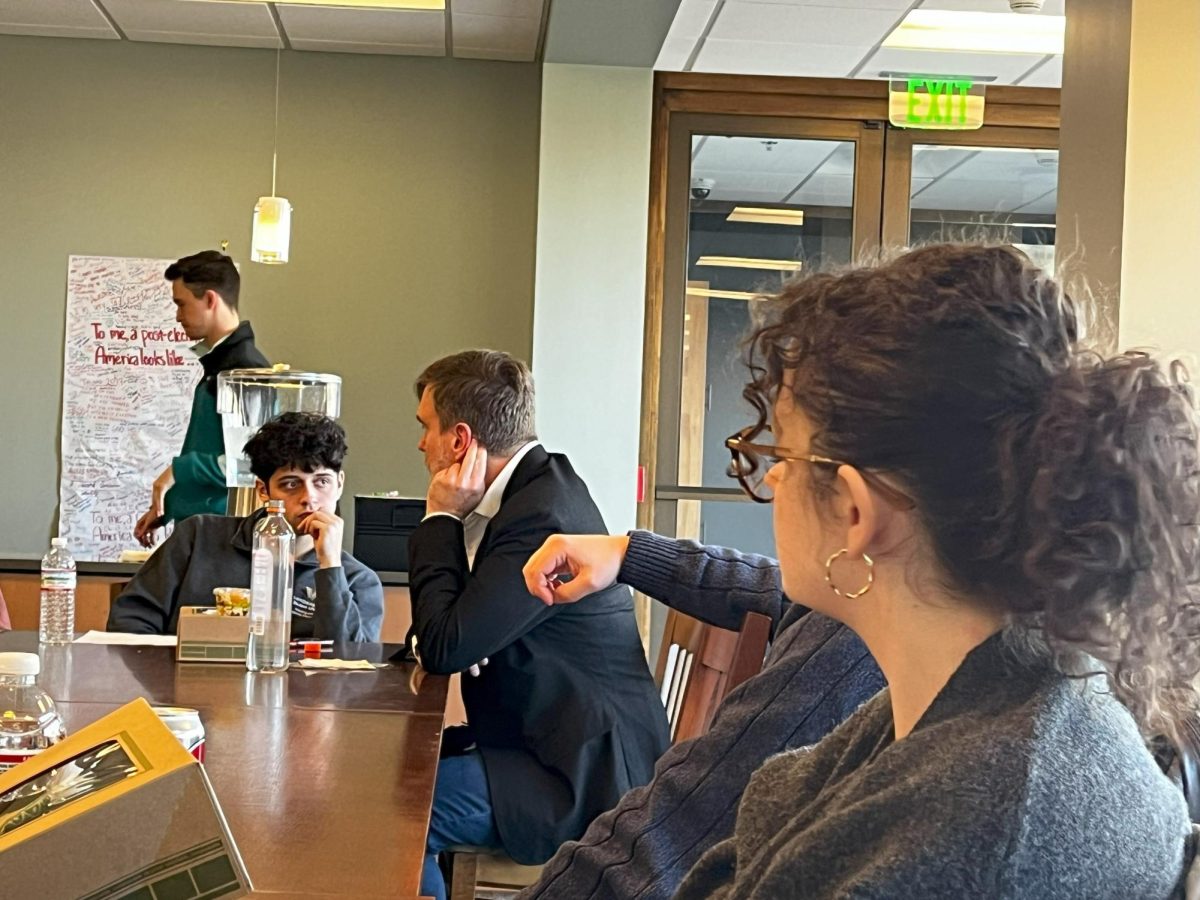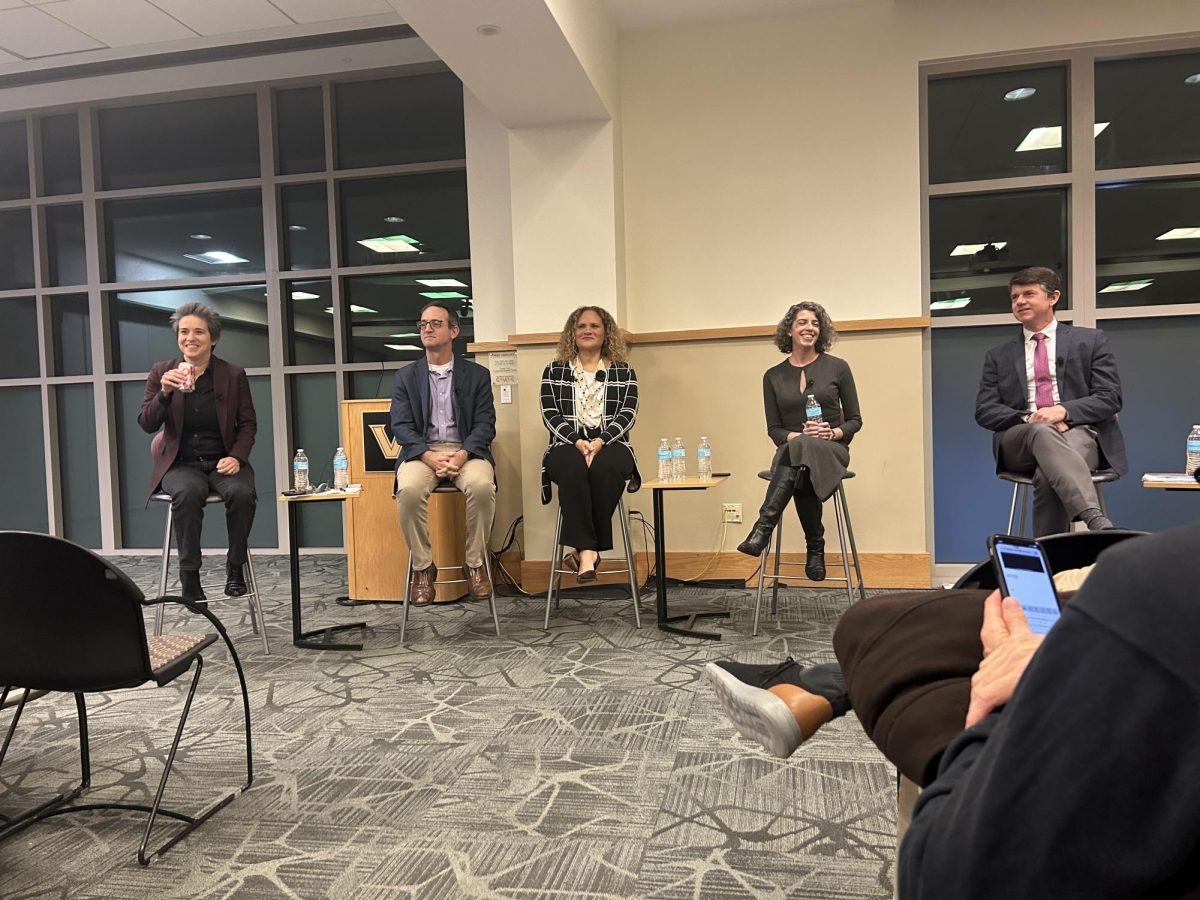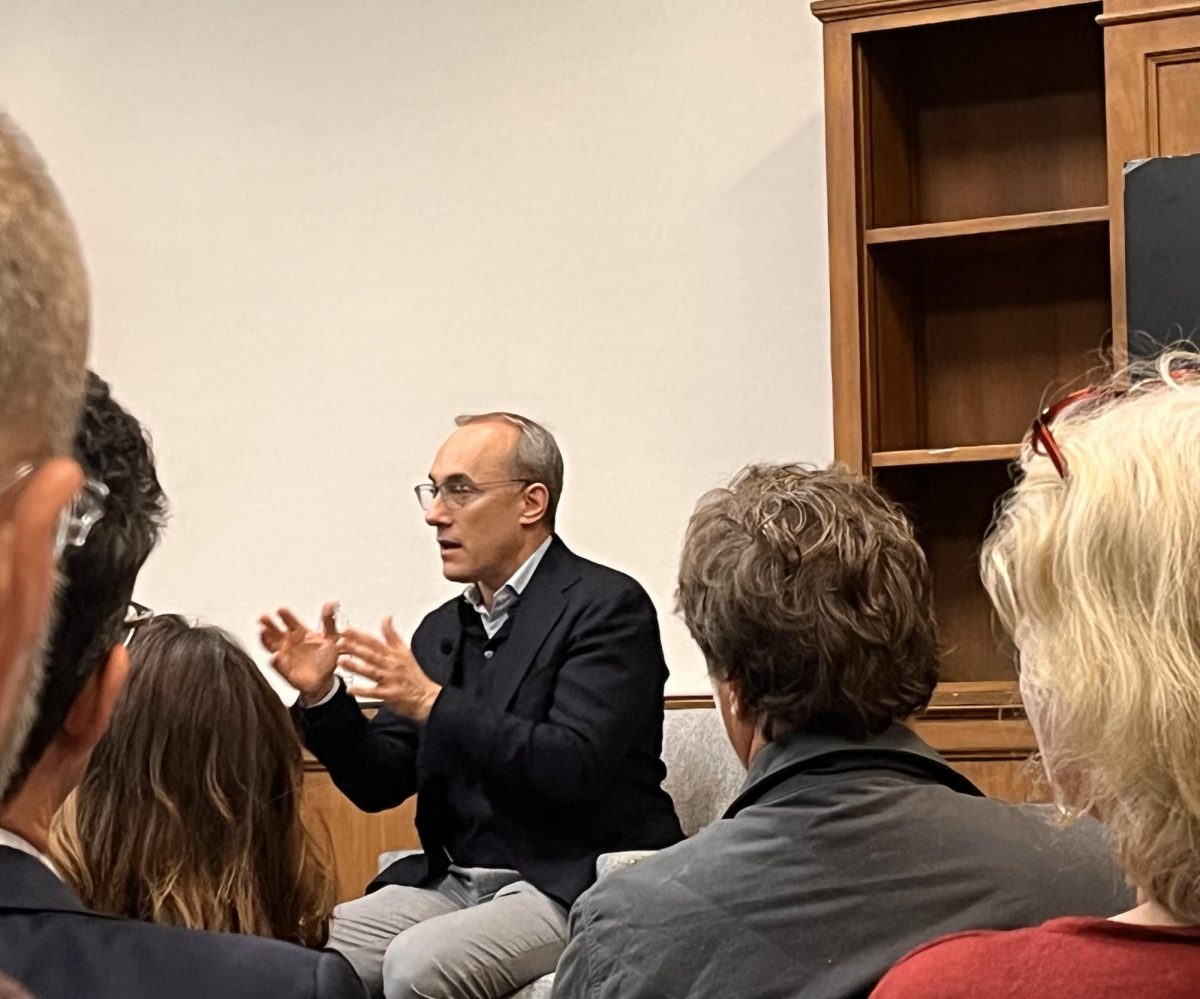Dialogue Vanderbilt and the Evolutionary Studies Department hosted evolutionary biologist Richard Dawkins for a conversation with David French, a New York Times opinion columnist, for the annual Darwin Day lecture and the inaugural event of the Centennial Scopes Trial event series. To an audience of roughly 800 students and community members, Dawkins and French discussed the current state of evolutionary science, morality in the absence of religion and the lasting impact of the Scopes Trial a century later.
Dawkins is an internationally renowned evolutionary biologist, bestselling author and emeritus fellow of New College, Oxford. The Centennial Scopes Trial programming, running throughout the spring semester, features events commemorating the 100th anniversary of The State of Tennessee v. John Thomas Scopes (1925) — commonly known as the “Scopes Monkey Trial” — and examining the role of evolutionary science in the modern world. The Scopes Trial, held in Dayton, Tennessee, was a 1925 legal case challenging the teaching of evolution in public schools. The Supreme Court ultimately ruled in Scopes’ favor, reversing the lower court’s decision to convict him.
Evolution and religion
Chancellor Daniel Diermeier introduced the event by discussing the historical significance of the Scopes Trial and its impact on debate at the intersection of religious faith and science. French followed with a question to Dawkins on the “state of scientific certainty” pertaining to the theory of evolution, to which Dawkins said that evolution was a “fact” and that the debate on its validity was “concluded.”
“It’s a remarkable fact that we can explain the existence of mechanisms as complicated as we are in terms of the laws of physics, which, in the universe at large, are extremely simple and yet, on this planet, has given rise to this incredible phenomenon of life [and] of the complex illusion of design which pervades the whole of the living world,” Dawkins said.
French relayed his personal experience as an evangelical Christian in a post-Scopes world, describing himself as a “product of the changed world” following the Scopes Trial. French then asked Dawkins to explain how the theory of evolution “inevitably lends itself to atheism,” and Dawkins said he felt religion was antithetical to Darwinism.
“The whole enterprise of Darwin is explaining how you can get from primeval simplicity to ineffable complexity. To suddenly import a divine creator at the origin of the universe is to cut the ground up from under that enterprise,” Dawkins said. “You’ve removed the entire rationale for Darwinism.”
French defended his belief that religion was compatible with the theory of evolution, citing the “millennia of human experience with the divine” and personal testimonies as evidence for the existence of God.
“If you’re looking at [scripture] that was created very close in time to when Jesus lived — much closer than many other historical accounts that we derive from the ancient world — relaying eyewitness accounts of seeing Jesus after the crucifixion, that would be a form of historical evidence that we, in almost any other context, would take as meaningful,” French said.
Dawkins disagreed with French’s point, saying he did not find the existence of witness testimonials to be convincing evidence.
“There are accounts of Elvis being seen [after his death],” Dawkins said. “The accounts — the written gospels — were written decades after the time that Jesus was supposed to live. That’s far less impressive than the sighting of Elvis or Hitler or numerous people who died and then appeared to people.”
Moral character and the Scopes Trial
French asked Dawkins how he believes one can navigate morality in the absence of a systematic set of beliefs.
“You are a person of real moral character and high moral standards,” French said. “Where are you deriving that [from]? What is the source of your moral character in the absence of anything but a sort of a physical process?”
Dawkins first responded by addressing the potential sources from which some people believe morality might be derived, citing the teachings of Jesus and similar principles laid out by other world religions. However, he argued that people do not extract their morality from the Bible or any other religious text, asserting that the moral norms pervading society at any given time are subject to the conventions of that particular era.
“There is a shifting moral zeitgeist that changes from decade to decade,” Dawkins said. “Everything that goes on in the public discourse adds up to a recognizable, by-the-decade moral outlook. That is where I think we get [our morality] from, whether we are atheist or religious.”
French then asked Dawkins what he meant by his self-identification as a “cultural Christian,” a sentiment that had sparked controversy in 2024.
“I went to Anglican schools and to chapel every day because I had to, and it means that I know my way around Christian scripture reasonably well,” Dawkins said. “I’m a cultural Christian in the sense that I am not a cultural Muslim or cultural Buddhist.”
When asked if the Sermon on the Mount had influenced him, Dawkins responded that the verse was clearly the “words of a wise, humane person,” but said he believes the criterion by which verses are judged as “good” is a modern one based upon the “shifting moral zeitgeist.”
“Why not cut out the middleman and just go straight to the morality which enables you to pick and choose [‘good’ Bible verses] in the first place?” Dawkins said. “Why justify it by finding the odd biblical verse that is decent and humane?”
French then moved the discussion to the lasting impact of the Scopes Trial, asking Dawkins if he believed the trial was “the single most important cultural moment” in the popular understanding of evolution. Dawkins disagreed, referring to the Scopes Trial as a “sham trial” that included very little scientific argument in the trial proceedings.
“If you actually read the arguments that were put forward, it was mostly about the legal obligation to teach creationism,” Dawkins said. “There was very little science discussed. In fact, I think the judge even ruled that professors of zoology were not admitted as expert witnesses.”
Audience reactions
Aditya Kurre, a senior and president of Vandy Karma, shared his views on Dawkins’ reaction to French’s defense of the Bible.
“[French] was giving quotes and very classic examples [from the Bible], [saying], ‘There’s a lot of good in this book,’” Kurre said. “It was quite surprising and alarming when [French] would say these things, and then Dawkins would react [saying], ‘I don’t find this impressive at all,’ [or], ‘There’s that one good verse in the Bible but most of them are bad.’ I obviously knew that [Dawkins] was controversial, but the directness of his responses was a little surprising.”
Thodoris Danis, a second-year Ph.D. candidate, said he anticipated Dawkins’ responses in the discussion.
“I wasn’t surprised by [Dawkins’] answers to the questions the interviewer asked him. I mean, it was expected, and [Dawkins] seems like he’s not going to change his mind,” Danis said. “I think he believes that there is no God — no matter what the interviewers ask him, it seems he’s pretty robust and straightforward in his opinions.”






